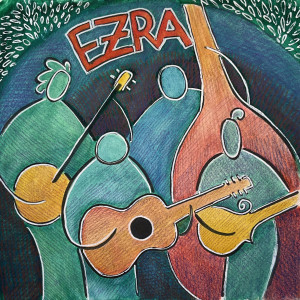 Remember back in the early 2000s when you first heard and were awestruck by the youthful virtuosity of Crooked Still? Or perhaps, a decade or so later, by the stringband supergroup vibe of The Goat Rodeo? I sure do, and those are the same feelings I got when I heard the first notes of the self-titled debut from what may be this decade’s roots supergroup Ezra.
Remember back in the early 2000s when you first heard and were awestruck by the youthful virtuosity of Crooked Still? Or perhaps, a decade or so later, by the stringband supergroup vibe of The Goat Rodeo? I sure do, and those are the same feelings I got when I heard the first notes of the self-titled debut from what may be this decade’s roots supergroup Ezra.
Ezra is a collective of musicians who pull together expertise from classical, jazz, rock, and bluegrass worlds into a seamless whole: multi-instrumentalist (and luthier) Jesse Jones on guitars and keyboards, world-renowned mandolinist Jacob Jolliff, banjo virtuoso Max Allard, and bassist extraordinaire Craig Butterfield.
I could spend the rest of the review laying down the histories, backgrounds, and bona fides of these four players, but I’d rather focus on the music, so you can get all that stuff at their website. Suffice it to say they draw from deep wells of education and experience, not to mention raw talent, both singly and in many different combinations.
Progressive stringband music has a long history by now, so when I use that term, you probably know what I’m talking about. Traditional acoustic instruments being used to make music that draws on old time music, while interpreting it through the filters of jazz and classical idioms in particular. Jones composed all nine tunes on the album, and it was recorded during his sabbatical from Oberlin Conservatory, where he’s a professor of composition. Then he invited the other three to Oberlin for an intense week of rehearsal and recording, and Ezra is the result.
From what I’ve read, it seems that Jones could have recorded the whole thing by himself, because he can build and play most if not all of these instruments. He notes that a couple of them, “Banjaleena” and “Dix-Neuf,” came about as he was exploring a particular tuning on banjo. The former is a fairly straight newgrass kind of tune, partly in 4/4 and partly in 6/8, with Allard totally killing the banjo part. The latter, the album closer, is a jazz-forward tune led by Jones on piano with mixed time signatures — a straight four on the banjo-driven melodic sections, and one I can’t figure out in the interstices. Jolliff impresses any time he puts plectrum to mandolin, and this tune is a great example. Weird key, weird time signature, shifting tempo … is this one going to be in my year-end favorite jazz or roots playlist? Maybe both!
The album opener is less puzzling, a lovely banjo-led progress bluegrass tune that gives bassist Butterfield a chance to show off his bowing and picking prowess. Jones leads with his lightning guitar flatpicking on “Jarrah,” but the lead shifts so quickly between guitar, banjo and mandolin that your head will spin. Butterfield’s bass provides a solid lead on the shifting time signatures of the aptly named “Contrabuffoon,” which gives nice long solo parts to the other three on guitar, mandolin and banjo.
Things slow down a bit on three of the tracks. “Beedabumbum” is as playful as its name sounds. “Garden Gate” is a fairly straightforward newgrass ballad, and the atmospheric “Cowboy Walks,” has a languid “Saturday Night At The World” vibe — Jones came up with this one while trying out a newly made guitar. (Extra credit if you got the Mason Williams reference.) And the spotlight is on Jolliff (who is releasing his own solo debut this spring) on the jaunty, Django-esque “The Jolly Jolliff.” Throughout, the players make opportunities to briefly improvise on Jones’s compositions, in ways that are more akin to bluegrass than jazz.
It’d be great if these four busy musicians could put together a bit of a tour, but I don’t see any news of one at this time. Meantime, you can keep up with them on Bandcamp, Facebook, and Instagram.
(Adhyâropa Records, 2024)
